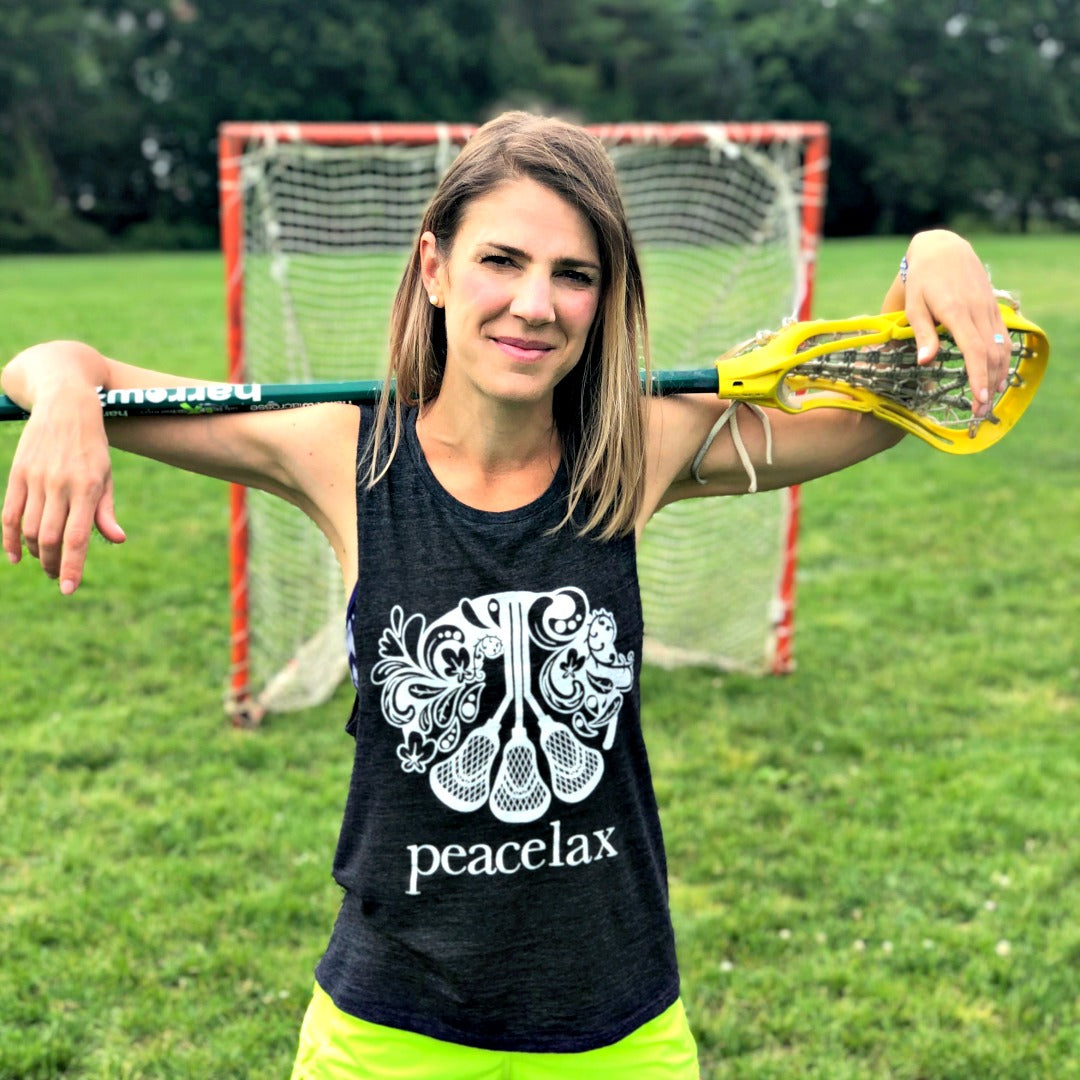Coaches on Coaching: Dara Packer

In our on-going Coaches on Coaching series, Swax Lax interviewed Dara Packer who is a girls club lacrosse coach, creative designer, and co-founder of PeaceLax. She grew up in Howard County, Maryland where she was introduced to the game at the age of 15. She played through college, being recruited to Mercyhurst University where she finished third in career points and graduated with a BA in the Arts with a concentration in Graphic Design.
Her company, PeaceLax is striving to make a positive impact on the well-being and mental health of athletes by partnering with and donating to organizations that share their sense of purpose.
Here’s what Dara told us:
Spreading Peace + Positivity through Lacrosse
How long have you been around the game of lacrosse?
I played competitively for eight years. I had never picked up a stick before my freshman year in high school—really hadn't heard of the sport until then (I even tried out for the team using a wooden stick!). Once I started, I was all in, my family was all in, and we were officially a lacrosse family!
Why your passion for lacrosse? What triggered it?
As I mentioned, I didn't start playing lacrosse until age 15. Around here, that simply doesn't happen often anymore. Kids start playing as soon as they can hold a stick, sometimes whether they want to or not. I spent most of my childhood as a dancer. I lived and breathed dance. I loved the way it made me feel—confident, strong, and able. I had a passion for ballet and I couldn't have said why I loved it so much back then, but I now know it was for the challenge and discipline it gave me. I loved seeing how far I could push my body. And I loved to perform. As many dance families know, the classes start piling up and it can become a financial strain. With my sister and I both dancing, we were forced to pull out. I found myself exploring different activities until a friend asked me if I was going to try out for our school's lacrosse team. I don't remember if I spent time thinking about it or not, but I found myself borrowing a friend's old wooden lacrosse stick—practicing throwing and catching with my father out in front of our house. The stick skills came fairly naturally, and it turned out that my dance background lent itself well to one of my favorite parts of being an attacker—rolling the crease! I was known to "dance" around the crease by my college teammates, and I not-so-secretly loved that they recognized how my dance background came into my game play.
One thing I want to highlight about my experience in falling into lacrosse is just that—I was given a childhood that allowed the space and time to simply fall into something. As parents and coaches (myself included), we have a tendency to micromanage the sports and activities our children become involved in. And sometimes we become so wrapped up in the idea that our children should be playing this or should be trying that and we miss those natural cues that they could be fitted for something else more fulfilling. Don't get me wrong, I love lacrosse—but, in the end I want my own children and the girls I coach to feel that same passion I did—and if that is outside of the lacrosse field, we need to be cultivating that.
What inspired you to start your own lacrosse company that centers on Peace + Positivity and a focus on “purely” enjoying the game?
With our other co-founders, the idea for PeaceLax originated because we saw a need to bring more of the focus back to the player and their well-being. Being around and coaching youth lacrosse for our own kids, we saw that the focus was moving away from them. It seemed like a lot of parents and coaches were getting caught up in counting wins and making the "right" political moves. And when your focus as a coach or parent is on anything other than your player—we are all in trouble. As long as that is the case, our players will never be getting what they really need from us. If you let it in, there can be a lot of negativity in youth sports. We believe that there can be a balance between playing hard and developing skills, while still remembering to keep perspective on how to take care of our sons and daughters. This is the basis of our tagline: Play hard, but remember. Just. Chill.
How did your lacrosse coaching experiences fuel your desire to get athletes to step back and remember the mental aspects of the sport?
I have to thank one of our co-founders, Mike, for really driving this home. He's been coaching longer than I have and has seen more ups and downs—his stories fuel me to be more attentive with my players and their mental well-being. The girls I coach are 8 and 9 years old. There are lots of tears for different reasons, sometimes a minor injury, another time for an unexpected yellow card (resulting in what felt like humiliation for my player), often for disagreements or hurt feelings. The bottom line is that these are children. When they are distressed emotionally for any reason, it is our job to nurture and protect them just as much as it is our job to nurture their developing skill set.
This year was our team's first experience as a club team. We played against a lot of players that had more club experience than we did and the outcome of our games reflected that. We had to find a way to keep the girls engaged, motivated, and all with a POSITIVE attitude while the losses tallied. Our main focus was really on the development of each player and having fun. Our girls blew us away with their undying enthusiasm and positivity despite enduring a tough season with a lot of losses. And as coaches, a season like that is undeniably hard—but even we need the reminder to step back and look at the bigger picture. I can honestly say each and every single girl improved leaps and bounds from the beginning of our season. And not only that, our coaching staff formed important bonds with each of the players, which was a direct result of making sure our players felt seen and heard by us. To me, that type of coaching lays the foundation for a healthy relationship between sports and emotional well-being.
PeaceLax and Swax Lax have similar approaches to the growth and health of players in the game, how do you see that alignment?
We want players to love the game and keep a positive attitude, win or lose. And we think that Swax Lax aligns perfectly with this message, as they offer players the opportunity to learn and practice the sport with less fear and more confidence, inspiring their mission to increase athletes' confidence at every level.
For us, we think that this confidence is important when it comes to athletes' mental health. Too often a player may hear the yells of spectators, the criticism of a coach, or what they could have done better on the drive home from the game. Without realizing it, the player can then start to associate their "worth" to success on the field. And then when the player faces adversity—not making a club team, getting cut from varsity, suffering an injury—then what are they left with? They may feel like they failed because of that worth-to-sports association they have in their mind. And this is why PeaceLax wants to create a more positive energy for all laxers. It’s why we also think that increasing all players' confidence, at all levels, aligns with our mission to cultivate PEACE + POSITIVITY and a renewed focus on PURELY enjoying the game.
What advice can you give to other coaches and programs for keeping all your audiences engaged with your philosophy and activities?
I think that if coaches or programs always put the well-being of the player first, then we can start to move the needle in the right direction. This goes for how you practice, how you compete, how you win or lose, and how you talk to your players (and parents). At a tournament last weekend with middle school aged teams, we saw a game get called early because a coach was upset with a call, got himself ejected, and then refused to leave the field. What kind of message is this sending to our players, parents, and fans? Was this coach thinking about what's best for his players? I admit that I have no idea what caused this coach to do this, but whatever the reason, from my view, he was not thinking about what's best for his players.
The kids remember the relationships, the bonds, and the positive or negative feedback much more than the score. I think too many coaches forget that their relationship with each player truly matters. For many young athletes, the coach's opinion, judgement, or attitude matters most and has the greatest impact, and each coach needs to realize the influence they can have over their players.
For me as a lacrosse coach, parent, and now helping run PeaceLax, I see how much of a better experience it is for the players when their well-being is always put first. It's a mission worth fighting for!
Please support PeaceLax by following them on Facebook and Instagram.

